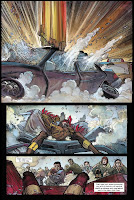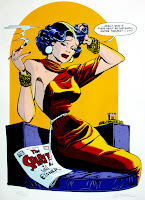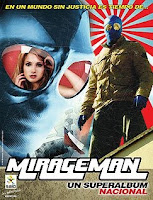Kick-Ass, directed by Matthew Vaughn, screenplay by Jane Goldman and Matthew Vaughn, based on the comic book by Mark Millar and John S. Romita Jr.
(N.B. In order to properly discuss Kick-Ass, I am forced to discuss the entire film. There will be spoilers.)
I went to see Kick-Ass on Friday night despite a savage review by Roger Ebert. I adore Ebert's writing and I generally agree with him about films, or at least reading his reviews expands my thinking about films which is just as valuable. Going into the film, I shared Ebert's concern that satirizing the violence that children are exposed to and the way that we over-sexualize young girls by presenting a hyper-violent 11 year-old sex kitten in latex was at best naive and at worst completely insane.
Kick-Ass
Watching Kick-Ass is like drinking a sweet milkshake made with milk that is just about to turn sour. It tastes good going down, but it curdles in your stomach the longer that it has to sit. The problem is that my issues with the film are different from Ebert's and in some ways diametrically opposed to his opinions; my objections are rooted in mythology - both Greek fables and comics arcana; my objections to this film are both massively geeky and esoteric.
Here is the problem: Kick-Ass lies to us. In its opening sequence, it bluntly states that this will not be a super-hero wish-fulfillment fantasy and then promptly becomes a super-hero wish-fulfillment fantasy.
The film opens with a man dressed in a super-hero costume, jumping off a building, trying to fly and plunging to his Icarusean death. Christopher Reeve to the contrary, you will believe that a man can NOT fly. But in the climax, Kick-Ass (Dave Lizewski) does fly. Admittedly, he does so with the help of human ingenuity, but it is not the kind of human ingenuity available to mere mortals - especially geeky teenagers. And with a little reflection, it will be obvious that the solution in question should not have been available to the film's characters either.*
One of the reasons that DC is always pairing Superman and Batman either against one another or in partnership with one another is because of the contrast - Day vs Night; God-like vs. Human. The distinction is normally described as Apollo vs Dionysus. I have never quite agreed. Sure Apollo works for Superman - they are both Sun Gods after all, but Batman is not Dionysus, he is Odysseus - the Ancient World's first great thinker.
Odysseus is the platonic ideal of the detective so determined to solve the mystery that he is willing to endure any beating from the fates to get to the truth. He was a man so determined to KNOW that he once figured out how to beat the sirens (wax hearing plugs) and after ensuring his crew was protected from their song, ordered his crew to lash him to the mast so that he could hear a song so tempting that it literally lured men to their deaths.
You can draw a
(And of all of those, Batman is the farthest from the Platonic ideal because he is almost literally richer than God. He can duplicate or transcend Superman's Apollonian gifts by spending enough. Or as Jack Nicholson's Joker wails, "Where does he get those wonderful toys?")
These heirs of Odysseus almost never get the girl. The safe girls would be in too much danger; and the dangerous girls whether they be named Irene Adler or Brigid O'Shaughnessy or P'Gell or Talia al Ghul are sirens that bring temptation and knowledge, but also death.
And while Millar may not have been doing much thinking of Odysseus and the roots of the detective masked or otherwise, he was certainly thinking of Will Eisner's The Spirit.
When approached to produce a Sunday comic book insert for a 20 paper syndicate, Will Eisner wanted to tell detective stories,
Creating a detective character would ... provide me with the most viable vehicle for the kind of stories I could best tell. The syndicate people weren't in full agreement with me.Eisner's solution was to put a domino mask on detective Denny Colt and call him The Spirit. His origin story had Denny solving a case by stopping Dr. Cobra from poisoning Central City's water supply with a paralytic agent, only to fall victim to that agent. Found in a death-like coma, Denny Colt is placed in the family crypt at Wildwood Cemetery, which becomes his base of operations when Denny wakes from his paralytic slumber.
-Will Eisner
While this origin was only intended to explain the Spirit's mask and Denny Colt's anonymity, some have taken the hint that the Spirit's resiliency in fights comes from his exposure to Dr. Cobra's venom. This is especially true in the Darwyn Cooke relaunch
In Kick-Ass, the main character on his first case endures a beating that leaves him close to death. In the process of saving his life, his bones are reinforced with metal plates and his injuries leave him with nerve damage that make it difficult for him to feel pain. We are supposed to see this as a Spirit-like transformation (confirmed by a movie marquee advertising The Spirit 3) but it's a cheat. When the Spirit endures a beating to discover the truth it is a reflection of his character, of who he is, of his dedication to the truth. When Kick-Ass endures a beating, it is because his own idiocy has made it possible for him to do so. Kick-Ass does not learn from his experiences, he just lucks into being better able to survive them in the future. He never even deals with the original neighborhood thieves who put him in the hospital on his first case.
Millar has taken great pains to boast that Kick-Ass is a realistic super-hero. And while others have rightfully mocked these assertions, my difficulty with them is that Millar is trying to position Kick-Ass as a masked crime-fighter like Will Eisner's Spirit or Marc Evanier and Dan Spiegel's Crossfire
(Or heck, if you want to see a great masked crime-fighter film, track down the Chilean film Mirageman imdb. Starring the Rock's stunt double from The Rundown
The point is - Kick-Ass claims to be a Odyssean masked crime-fighter when he is really an Apollonian wish-fulfillment hero, never more dramatically than when he seduces Katie. By all rights, after Dave simultaneously reveals that he is Kick-Ass and only pretending to be gay so that she would confide in him as her gay BFF, Katie should push Dave Lizewski out her bedroom window rather than turning into a character from Penthouse Forum. That she becomes a fulfillment of Dave's fantasy is a real disservice to her character.
Nicholas Cage's Big Daddy is no less sacrilegious, taking Adam West's almost gentle 1966 take on Batman and turning him into a child-abusing murderous psychopathic gun-nut. The film gives him a better reason for being a vengeful psychopath than Millar's graphic novel, but finding a better reason for the inexcusable is merely gilding the lily.
The only saving grace of the film for me is Chloë Grace Moretz' Hit-Girl and when you are finding consolation in a Russ Meyer killer sex kitten - only warped as if by design for pedophiles, you are straining for small victories.
Yes, Hit Girl sees and does horrifying things, yet somehow retains her innocence, protected by a cocoon of madness, like Lear as a pre-pubescent assassin.
The key I think is the music. In almost every action scene with Hit-Girl there is music, beginning with her rescue of Kick-Ass accompanied perversely by "Tra La La" from The Banana Splits Adventure Hour. And here, I think I had better quote Rich Johnston's review from Bleeding Cool:
The Banana Splits song used in the fight scene starring Hit Girl (Chlow Moretz), a twelve year old master assassin mentored by her father the Batman-looking Big Daddy (Nicolas Cage), demonstrates this perfectly. She performs these impossible action-star moves, a twelve year old girl cutting grown men in twain with a sword held in one hand, attacking, leaping, dodging and basically kicking the shit out of a roomful of adults, we enter her head with the music, which is suddenly equally impossible – and the whole begins to make some kind of internal sense. This is her reality, she sees everything as a game. Why not have such an upbeat silly inappropriate theme tune going on?What the music tells me is that Hit-Girl lives in a twisted and dangerous video-game reality that her father has prepared for her. This is never more evident than in the warehouse scene where Hit-Girl calmly blows away Italian mobsters in first person shooter style while her father is literally burning to death. Worse, while dying, Big Daddy is busy shouting out cheat codes for Hit-Girl to use like some demonic Microsoft Paper-Clip.
-Rich Johnston
After her father's death, Hit-Girl's music turns darker - first with western revenge thanks to Ennio Morricone's Per Qualche Dollaro In Piu (For A Few Dollars More), followed by the desperate banshee wail of Joan Jett's Bad Reputation. And silence begins to interject itself as well, the silence of reality intruding on Hit-Girl's cocooned fantasy. The silence first becomes intrusive when Hit-Girl is trapped, out of ammunition in the kitchen, only to be rescued by Kick-Ass and Elvis Presley's Battle Hymn of the Republic (a nice call back to Nicholas Cage who rather famously married Elvis' daughter and played Elvis impersonators twice in Wild at Heart
The silence descends for good while Hit-Girl is fighting the man who ordered her father's death, Mark Strong's Frank D'Amico. While Hit-Girl could have killed D'Amico quickly by picking up a gun dropped by D'Amico's goons when she slaughtered them in the hallway, Hit-Girl is confident of her invincibility until D'Amico gives her a bloody nose. It is at this point when the music stops that Hit-Girl reaches the boundaries of her Father's programming - he punched her in the chest so she was prepared for that; he shot her in the chest and so she was prepared for that, but he never punched her in the nose. It is only at the moment that she is unprepared, that she becomes for the first time in the film, Mindy Macready, a frightened little girl who misses her Father, not the grotesque Big Daddy, but Damon Macready - a man who dug his own grave long before he died.
Mindy Macready is the only character in the film that actually learns anything. Even as she has to be rescued from Frank D'Amico, she is able to transcend the fantasy she was programmed into and reclaim her real name when she takes off her mask and introduces herself to Dave Lizewski (KIck-Ass) as Mindy Macready.
Some might object that she reverts back to Hit-Girl behavior in the film's coda, but just because Mindy has transcended the fantasy and entered real life, doesn't mean that she has to passively accept bullying on her first day of school.
All of that said, as great an evolution that Mindy goes through, I personally don't feel that it redeems the rest of the film's stupidity and hypocrisy.
*****
For a sixty second illustrated review of Kick-Ass, consult Chris Sims of the Invincible Super-Blog, also of the mockery that I mentioned far far above.
And for a parallel view of Hit-Girl examining how the audience comes to identify with her (which I read after finishing this review), consult Katey Rich of Cinema Blend.
*****
* Still reading? OK here is why the jet-pack is unrealistic. Yes, Big Daddy and Hit-Girl were ripping off D'Amico's drug operations and Hit-Girl has 3 million dollars in a suitcase. But it's not like they can just deposit the money in Bank of America and get an Onyx American Express card or whatever credit card that you need to be able to add a $300, 000 jet-pack to a shopping cart.
Also, at the risk of being a killjoy (too late), I cry BULL! and SHIT! that the jet-pack in question would be able to get that high period, let alone while carrying two Gatling guns and about 1000 rounds of ammunition.
(All images are copyright to their appropriate owners.)













